Otello
Giuseppi Verdi (Music); Arigo Boito (Libretto)
West Bay Opera
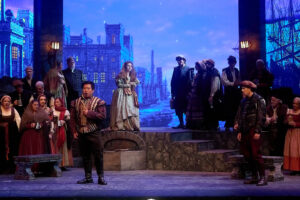
After his successful Aida premiered in 1871, the great Giuseppi Verdi decided with firm finality to retire from opera composition; but the librettist Arigo Boito had other ideas. Boito’s persistent temptations for Verdi to tackle one of Shakespeare’s greatest tragedies, Othello, finally led to a eight-year, on-and-off again period of creation, leading to the premiere of the immediately successful Otello in 1887 — an opera that the grand master actually wanted for a long period to title Iago.
In a staging brimming with theatrical excellence, musical sublimity, and production mastery, West Bay Opera opens for only two weekends Verdi’s Otello — a must-see mounting and perhaps one of the best offerings in the company’s long history of producing big-stage-worthy operas in the quite intimate Lucie Stern Center of Palo Alto.
As lightning strikes from all directions, a large Chorus of the people of 16th-century Cyprus look toward an angry sea, singing in resonating waves of harmonized voices their prayers for a floundering ship carrying their Governor, Otello, whom they refer as “the Winged Lion of St. Mark.” Among the crowd is one whose prayer is different from all others: “May the sea be his tomb.”
When the hopes of the populace are fulfilled and Otello arrives with much flurry of orchestra trumpeting and glorious songs of victory by the cheering crowd, the one naysayer — Otello’s ensign, Iago — begins his insidious plan to destroy the General for naming Cassio his Captain rather than himself. And thus begins the spinning of a web by one of Shakespeare’s most vile villains — a web that will quickly attract a vulnerable Otello whose inbred flaw of jealousy is about to emerge and take over his being.
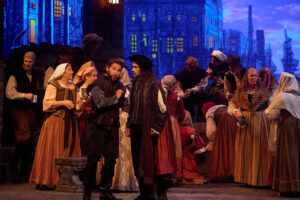
The moment Iago begins plying Roderigo — a soldier in secret love with Otello’s bride, Desdemona — with lies that his rival Cassio is also in love with her, it is clear Robert Balonek’s strikingly clear, full-voiced bass-baritone will reign supreme as his Iago meticulously spins his web of revenge. Iago convinces Roderigo (Carmello Tringali) to keep filling Cassio’s (Thomas Mulder) wine cup to the brim as the three join a host of drinking Cypriots in sung laughter and calls to “Drink, drink, drink.” With clarion notes that begin to slide and slur, Cassio sings “I am not afraid of the truth. “ What we know is that it is instead Iago’s lies to come that he should mortally fear.
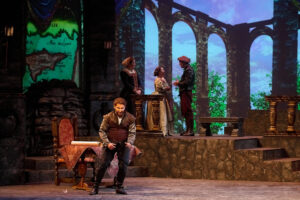
Iago’s Step One of his diabolical scheme succeeds when Montano (Daniel Morris) calls a stumbling Casio to his watch and is then attacked by the inebriated Casio after Montano declares in his rich bass-baritone that Casio is “a drunkard.” As the entering Otello sees a bleeding Montano and hears a tattle-tale Iago describe his well-crafted version of what happened, an angry Otello demotes Cassio and names “Honest Iago” the new Captain. In bass-baritone splendor, Iago sings, “Oh, what a triumph for me!”
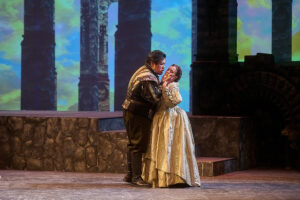
Before Iago can move on to Part Two of his developing plan to rid himself of Otello, the General and his bride are given a chance by Verdi to sing their mutual love and devotion. With mesmerizing voices that exude in passion, tenor John Kun Park and soprano Julia Behbudov remember their first meeting, locked in gazes as they tenderly join together in song and in arms. Otello’s rich and robust tenor intones a hypnotically soothing admission to Desdamona, “[You are] the blessing of glory, heaven, and stars descending.” He opines beautifully “You loved me for my misfortunes; and I, you for your compassion.” When Otello hesitates and slightly shudders singing, “I fear this rapture will never be granted again,” we in the audience know that to be true and to know his ‘misfortunes’ will soon overlook Desdemona’s ‘compassion.’ Such is the richness laced into Boito’s libretto.
The universally known story of Iago’s trail of plotted tragedy continues step-by-step as Robert Balonek brings both his incredibly impressive vocal and acting skills fully to bear. With silvery, slithering notes of ploy and smiles that hide his evil intent, he convinces Cassio to seek Desdemona’s help in convincing Otello to reinstate his office as Captain. In a soliloquy of stinging song, his tenor reverberates, “I believe in a cruel god who created me in his image,” going on in rolling notes that rise in both volume and evident pride, “I was born vile.” Facing us, the audience, as if daring anyone to disagree, he sings, “After all this, one day comes Death … Death is nothing … Heaven is an old widow’s tale,” punctuating his final declaration with satanic laughter and glaring eyes.
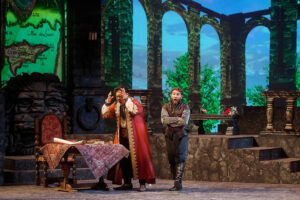
With sustained notes that slither out both deadly and beautiful — now to engulf Otello with his coils of deceit — Iago approaches the General with “a thought … whimsical but without malice.” But of course that thought is now the seed of suspicion that will soon blossom into a deadly vine to strangle Otello’s better judgment.
As his venom works it poison on Otello, the General quickly leaves behind all the declared love he so shortly ago bestowed on Desdemona. John Kun Park’s tenor once capable of caressing tones now erupts into forceful notes of flying, sharp arrows aimed at accusing his innocent wife of being “impure” and “a flagrant courtesan.” Park is a transformed delirious monster as he shakes, trembles, and collapses more than once in his horrible fits of jealousy. He sings in anger and anguish, “The sun, smile, and flower that kept me alive, here vanished.” Nearby, Iago watches with a satisfied smirk.
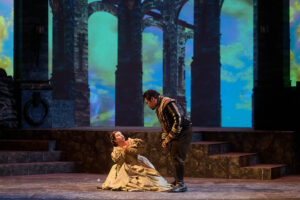
Having just been showered by a town’s gorgeously sung praises along with gifts of flowers and pearls while singing in her soprano finest of the joy, love, and hope that fills her heart, Julia Behbudov’s Desdemona now shrinks in first shock and then rising fear of a husband’s false accusations. Increasingly, her once joyous tones turn mournfully plaintive — notes that rise effortlessly their scales to hang aloft in sad sustaining. A final act filled with her last minutes of prayer and life are heartbreakingly stunning.
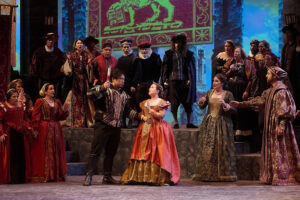
So many aspects of Verdi’s genius and Richard Harrell’s choices for stage directing the opera’s unfolding tragedies deserve much praise. One of the most astounding scenes is in itself worth the price of the evening’s ticket. As Otello’s fury rises to its heights against a wife now stricken in shock and fright as she receives his threats of violence, a stage full of stunned citizens, soldiers, and now visiting, Venetian officials react in their own disbelief and horror. The separately sung observations and opinions of Otello, Desdemona, Iago, his wife Emilia (Laure de Marcellus), Roderigo, Cassio, and Venetian Ambassador Lodovico (Isaiah Musik Ayala) rise along with repeated sung reactions by both the surrounding crowd of men and of women looking on with horror. All the voices rise together clash like rolling, crashing waves of a stormy sea. The varying pulses, pauses, and poundings of differing, sung phrases from so many sources is breath-taking and fully foreboding of the impending doom of the opera’s final act soon to follow.
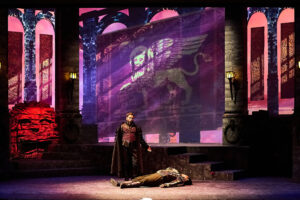
As meritorious are the performances of this spectacular cast of principals and of this much-accomplished chorus of near-thirty (under the direction of Chorus Master Bruce Olstad), many plaudits are also due the inspired direction of Conductor (and WBO’s Artistic Director) José Luis Moscovich and the twenty-five piece orchestra whose gorgeous rendition of Verdi’s score would make a wonderful evening of just their concert music. Peter Crompton’s set and projection designs not only instill a sense of a town rich in its history and its surrounding of sea, his embedding the emblem of the winged lion first as triumphant banners and later as a decaying rock is brilliantly symbolic. Daniele Ferguson’s lighting design brings sea, sky, weather, time of day, and mood changes to life and is especially important during Desdemona’s final minutes of fervent prayer on bended knees. Callie Floor dons principals and Chorus members in costumes that bring the time period, the Mediterranean location, and the importance of the ruling Venice all to picture-perfect reality.
What a shame it will be if every seat of Lucie Stern Theatre is not filled for the three final performances of West Bay Opera’s not-to-be-missed Otello.
Rating: 5 E, MUST-SEE
A Theatre Eddys Best Bet Production
Otello continues 2 p.m. May 23, 7 p.m. May 31, and 2 p.m. June 1 in a three-hour, production (including two intermissions) by West Bay Opera at Lucie Stern Center, 1305 Middlefield Road, Palo Alto. Tickets are available online at https://www.wbopera.org/ or in person and by phone at the box office Monday – Friday 1-5 p.m. at 221 Lambert Avenue, Palo Alto (650-424-9999).
Photo Credits: Courtesy of West Bay Opera

Leave a Reply